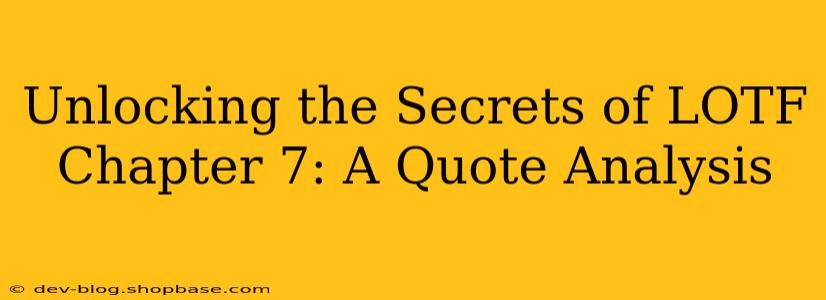Lord of the Flies, William Golding's chilling exploration of human nature, reaches a critical turning point in Chapter 7. This chapter marks a significant escalation in the boys' descent into savagery, fueled by fear, primal instincts, and the seductive power of unchecked power. Analyzing key quotes from this pivotal chapter illuminates Golding's masterful storytelling and provides deeper insight into the novel's enduring themes.
Key Quotes and Their Significance: A Deep Dive
This section will dissect several crucial quotes from Chapter 7, examining their context and revealing their hidden layers of meaning. We will explore how these quotes contribute to the overall narrative and advance Golding's overarching message about the inherent darkness within humanity.
"The shell was chipped and broken, but it was still beautiful." This seemingly simple observation of Piggy's spectacles underscores a crucial theme: the fragility of civilization and intellect. The shell, symbolizing order and reason, is damaged, mirroring the boys' deteriorating state. Piggy's appreciation for its beauty, despite its imperfections, highlights his unwavering belief in the power of reason, even as it crumbles around him.
"He'd got the conch," said Ralph. "That's why they're afraid of him." Ralph’s statement points to the conch's dwindling power. Initially a symbol of democratic order, it is now associated primarily with fear, demonstrating the shift in power dynamics and the boys' growing disregard for established rules. This loss of authority is a significant step toward complete chaos.
"Kill the pig. Cut her throat." This chant, uttered by the hunters, marks a pivotal moment. The ritualistic nature of the words reveals the intoxicating allure of violence and the descent into bloodlust. It showcases how easily the boys transition from hunting for food to hunting for the sheer thrill of the kill. The dehumanization of the pig further highlights this disturbing development.
How does Chapter 7 portray the breakdown of civilization?
Chapter 7 vividly portrays the utter collapse of civilization on the island. The boys, initially attempting to establish a structured society, abandon any semblance of order and succumb to primal instincts. The hunt becomes less about survival and more about savage ritual, marking a clear shift from reason to instinct. The loss of the conch's authority, Piggy's increasingly marginalized position, and the brutal murder of Simon symbolize the complete dismantling of the fragile society they once attempted to create.
What role does fear play in Chapter 7's events?
Fear plays a crucial role in driving the events of Chapter 7. The boys' fear of the unknown, fueled by superstitious beliefs about the island and the "beast," fosters an environment of paranoia and suspicion. This fear, coupled with their descent into savagery, leads to violence and ultimately, tragedy. The fear itself becomes a weapon, manipulated by Jack to consolidate his power.
How does Jack consolidate his power in Chapter 7?
Jack expertly exploits the boys' fears and insecurities to consolidate his power in Chapter 7. He manipulates their primal instincts by focusing on the hunt and the "beast," effectively creating a sense of urgency and need for a strong leader. The ritualistic killing of the pig allows Jack to transform himself from a mere leader into a charismatic, albeit brutal, figurehead, whose power is rooted in fear and intimidation. His actions directly challenge Ralph's authority and reveal the inherent dangers of unchecked power.
What are the key symbols in Chapter 7 and what do they represent?
Chapter 7 is rich in symbolism. The conch, already weakened, represents the fading hope for civilization and rational thought. Piggy's spectacles, representing intellect and clear sight, are increasingly threatened. The pig itself becomes a symbol of primal savagery and the boys' willingness to embrace violence. The "beast," whether real or imagined, embodies the inherent darkness within human nature and the fear that consumes the boys.
Conclusion: A Turning Point in the Novel
Chapter 7 of Lord of the Flies serves as a critical turning point. It's not merely a step towards savagery; it is a plunge into the abyss. By analyzing the key quotes and symbolism within the chapter, we gain a deeper understanding of Golding's powerful message about the fragility of civilization, the seductive nature of power, and the enduring darkness that lurks within the human heart. The chapter's unsettling events continue to resonate with readers, prompting reflection on the importance of reason, order, and the ever-present struggle against our baser instincts.

